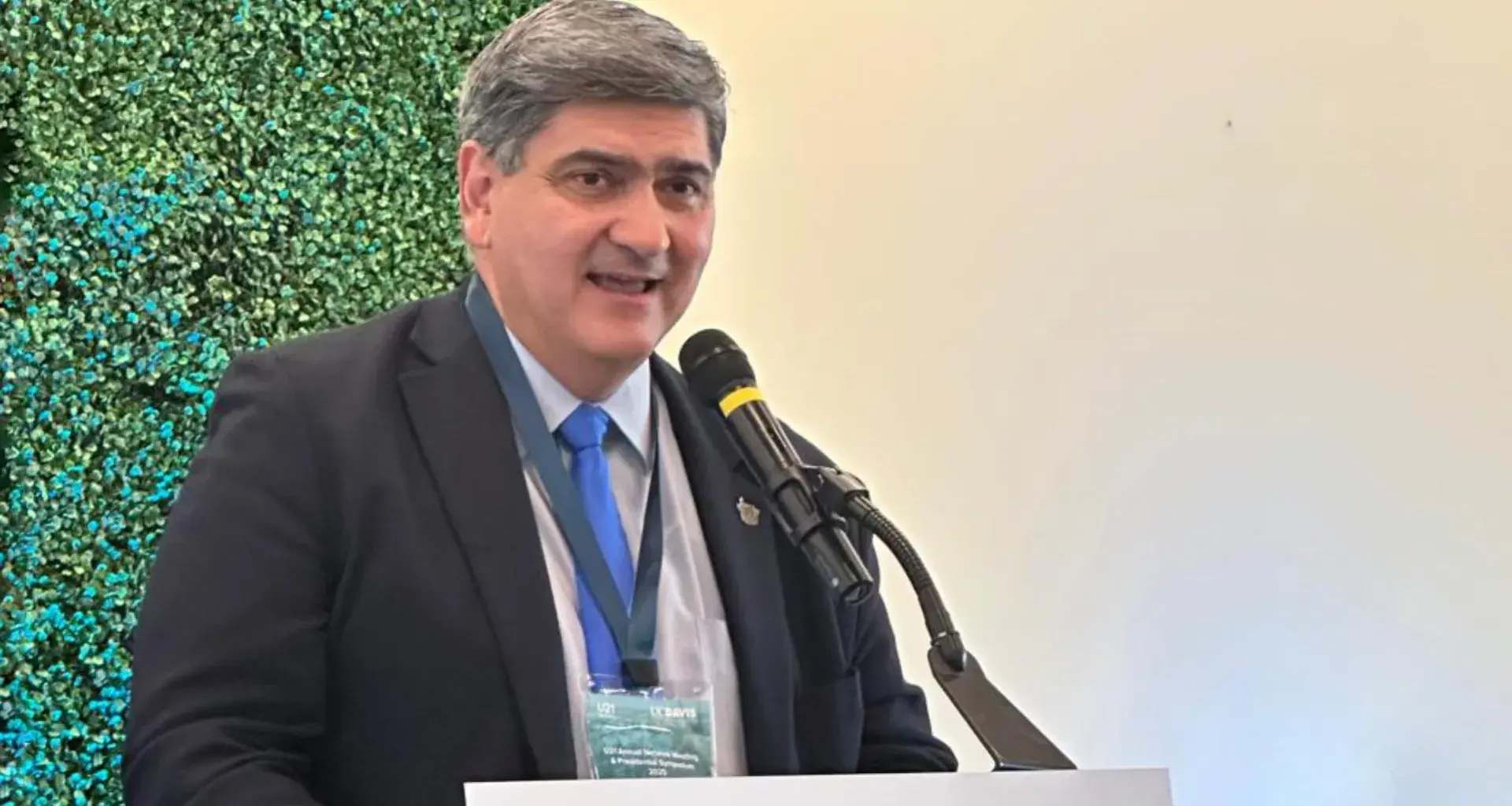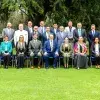President of the Tecnológico de Monterrey Education Group David Garza has chaired the annual meeting and presidential symposium of global university network U21 or Universitas 21.
This meeting was held at UC Davis, in Sacramento, California, from May 7 to 9 under the theme: “Imagining the Future of Higher Education.”
Universitas 21 is a global network of 30 universities from six continents with a strong focus on research.
Mexican David Garza chaired his first annual meeting as Chair of this organization, a position he assumed at the end of last year.
“The challenges are out there. And although these may be turbulent times, what’s important is that we’re together. We share values and aspirations. That’s what makes U21 a very valuable network,” said Garza in his opening address.
“Today more than ever, what counts is international collaboration, pursuing our values and aspirations, andcontinuing to imagine the future of higher education,” he added.
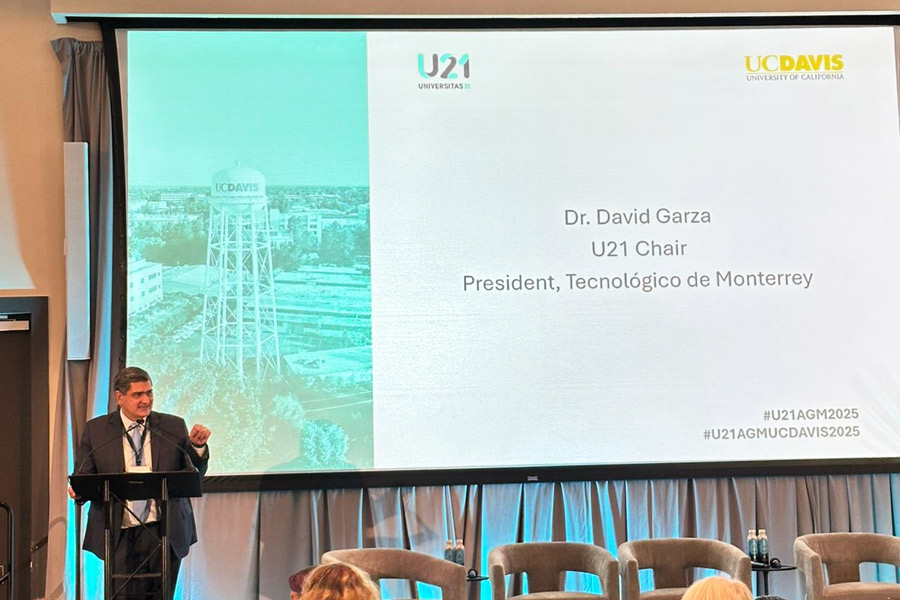
The U21 annual meeting
Topics such as the following were addressed over the three days of the meeting of university presidents and vice-chancellors:
- Leading in the midst of adversity
This panel discussed the pressures and demands on university leaders in changing times.
- Trends in higher education
Here, they spoke about important contemporary issues in several parts of the world and key aspects of higher education today.
- Inclusion at universities
The panel entitled “The Responsibility of Universities to Underrepresented Communities” discussed the needs for community support and inclusion. Participating in this discussion was Inés Sáenz, the Tec’s Vice President of Inclusion, Social Impact, and Sustainability.
The meeting also awarded prizes and recognition for efforts made by the network on Climate Action and Inclusive Global Participation, to name but two.
“I can confirm that we in the higher education sector are the sector of hope (...) We have the opportunity to contribute to a better world, which I wouldn’t change for anything,” said David Garza.
“We all know it’s hard to predict the future, but as someone once said, the best way to predict the future is to invent it. That’s what we’re trying to do,” he added.
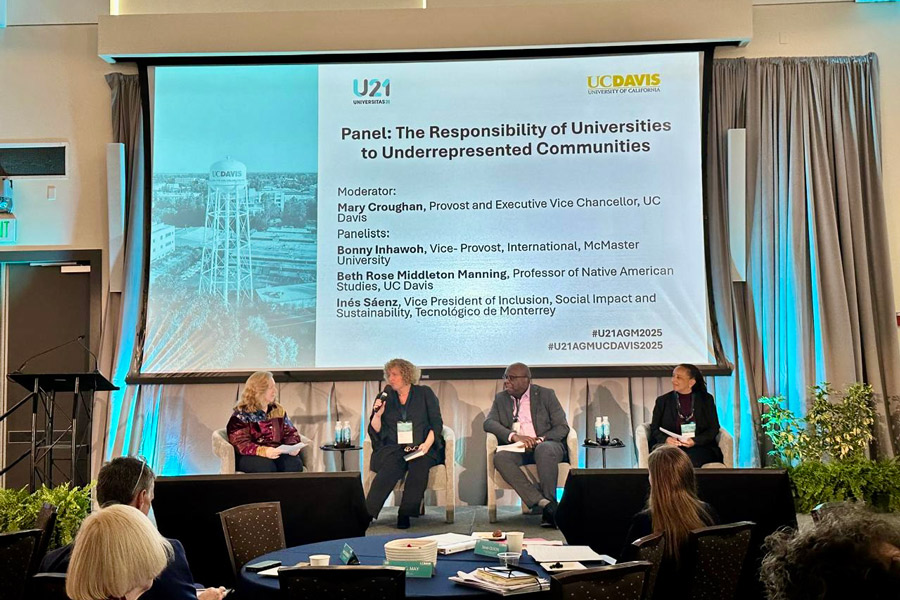
Tec de Monterrey and U21
The president of the Tecnológico de Monterrey Education Group has been Chair of U21 since November 2024.
He is the first Latin American chair of this global network.
Tec de Monterrey is currently the only Mexican university and one of only two from Latin America, together with the Pontifical Catholic University of Chile, to belong to this network.
“At the end of the day, I’m representing the Tec at a very high-level forum of peers and in a role where there are great expectations,” he said in this regard to CONECTA.
Garza said that he had shared his vision of the future role of universities with attendees during this meeting.
Jenny Dixon, Provost of U21, told CONECTA how important the Tec was as a leading university in Latin America on a later visit to the institution’s Monterrey campus after U21’s annual meeting.
“The connection with its people, companies, and other social stakeholders is palpable (...) It has prospered in these 80 years of its history largely due to how it has connected with its community,” she highlighted.
Regarding the U21 meeting, Dixon said that it had been an opportunity to meet up for three days and discuss how to work together, how to address certain international crises, and how to think about internationalization going forward.
“As a network, we’re really committed to the idea of internationalization and, similarly, to the idea of collaboration over borders and diverse cultures. That’s the DNA of our Universitas 21 network.”
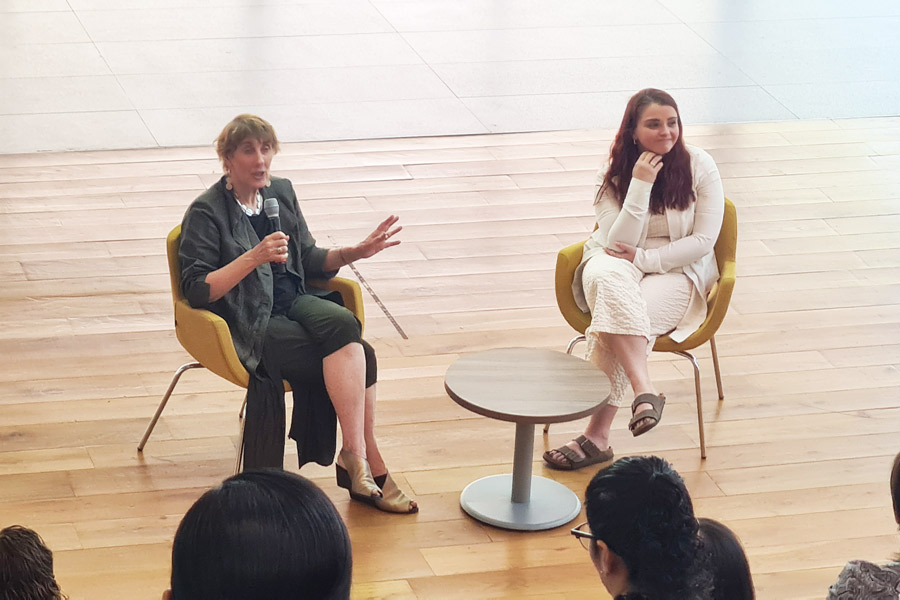
About Universitas 21
Universitas 21 was formed in 1997 and is a diverse, global network that brings together 29 universities from 19 countries in the Americas, Europe, Asia, Africa, and Oceania.
These research-intensive universities share a common belief in the value of collaboration and internationalization.
The network has a large concentration (60%) of member universities ranked in the global Top 100 (QS and THE) that impact over one million students and 200,000 professors and staff through collaboration programs, research opportunities, learning, and development.
It is made up of the following universities, listed according to their position in the QS World Universities Rankings 2025:
- National University of Singapore (QS 8)
- The University of Melbourne, Australia (QS 13)
- The University of Hong Kong, China (QS 17)
- University of Sydney, Australia (QS 18)
- UNSW Sydney, Australia (QS 19)
- The University of Edinburgh, United Kingdom (QS 27)
- Fudan University, China (QS 39)
- The University of Queensland, Australia (QS 40)
- Shanghai Jiao Tong University, China (QS 45)
- University of Amsterdam, Netherlands (QS 55)
- KU Leuven, Belgium (QS 63)
- The University of Auckland, New Zealand (QS 65)
- Korea University, South Korea (QS 67)
- Lund University, Sweden (QS 75)
- University of Glasgow, United Kingdom (QS 78)
- University of Birmingham, United Kingdom (QS 80)
- Pontifical Catholic University of Chile (QS 93)
- University of Nottingham, United Kingdom (QS 108)
- University of Zurich, Switzerland (QS 109)
- University College Dublin, Ireland (QS 126)
- UC Davis, United States of America (QS 130)
- McMaster University, Canada (QS 176)
- Waseda University, Japan (QS 181)
- Tecnológico de Monterrey, Mexico (QS 185) * Member since 2006
- University of Maryland, United States of America (QS 218)
- Gadjah Mada University, Indonesia (QS 239)
- University of Johannesburg, South Africa (QS 312)
- University of Delhi, India (QS 328)
- University of Connecticut, United States of America (QS 565)
Tec de Monterrey’s international mission
Besides being Chair of Universitas 21, the Executive President of Tecnológico de Monterrey is a member of the Steering Committee of U.S. accreditation body SACSCOC and the Board of Trustees of the Association of Pacific Rim Universities (APRU).
He also belongs to the President’s Council of the University of the People and is a Champion of the World Economic Forum’s Edison Alliance.
Tecnológico de Monterrey also participates in other international networks, has signed research agreements with more than ten global Top 200 institutions and universities and over 50% of its scientific publications are made through international collaborations.
Every year, 7,000 of its students participate in international exchanges, which makes it one of the universities with the most student mobility in the world.
ALSO READ:

